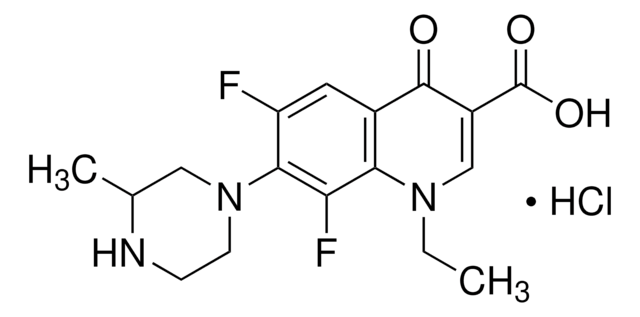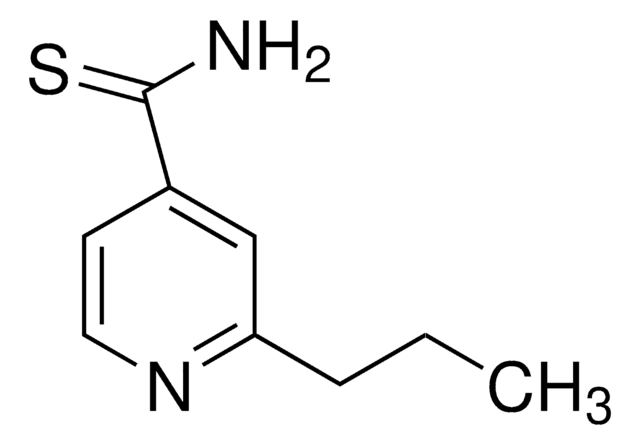28266
Levofloxacin
98.0-102.0% anhydrous basis (HPLC)
Sinónimos:
Levofloxacin Anhydrous, (−)-Ofloxacin
About This Item
Productos recomendados
biological source
synthetic
Quality Level
assay
98.0-102.0% anhydrous basis (HPLC)
form
powder or crystals
color
light yellow-white to yellow-white
antibiotic activity spectrum
Gram-negative bacteria
Gram-positive bacteria
mode of action
enzyme | inhibits
SMILES string
OC(C(C1=O)=CN2C(C1=CC(F)=C3N4CCN(C)CC4)=C3OC[C@@H]2C)=O
InChI
1S/C18H20FN3O4/c1-10-9-26-17-14-11(16(23)12(18(24)25)8-22(10)14)7-13(19)15(17)21-5-3-20(2)4-6-21/h7-8,10H,3-6,9H2,1-2H3,(H,24,25)/t10-/m0/s1
InChI key
GSDSWSVVBLHKDQ-JTQLQIEISA-N
Gene Information
human ... KCNH1(3756)
¿Está buscando productos similares? Visita Guía de comparación de productos
Application
Biochem/physiol Actions
Packaging
Other Notes
signalword
Danger
hcodes
Hazard Classifications
Acute Tox. 4 Oral - Resp. Sens. 1A - Skin Sens. 1A
Storage Class
11 - Combustible Solids
wgk_germany
WGK 3
flash_point_f
Not applicable
flash_point_c
Not applicable
ppe
dust mask type N95 (US), Eyeshields, Faceshields, Gloves
Certificados de análisis (COA)
Busque Certificados de análisis (COA) introduciendo el número de lote del producto. Los números de lote se encuentran en la etiqueta del producto después de las palabras «Lot» o «Batch»
¿Ya tiene este producto?
Encuentre la documentación para los productos que ha comprado recientemente en la Biblioteca de documentos.
Los clientes también vieron
Artículos
Quinolones are a key group of antibiotics that interfere with DNA synthesis by inhibiting topoisomerase, most frequently topoisomerase II (DNA gyrase), an enzyme involved in DNA replication.
Nuestro equipo de científicos tiene experiencia en todas las áreas de investigación: Ciencias de la vida, Ciencia de los materiales, Síntesis química, Cromatografía, Analítica y muchas otras.
Póngase en contacto con el Servicio técnico













